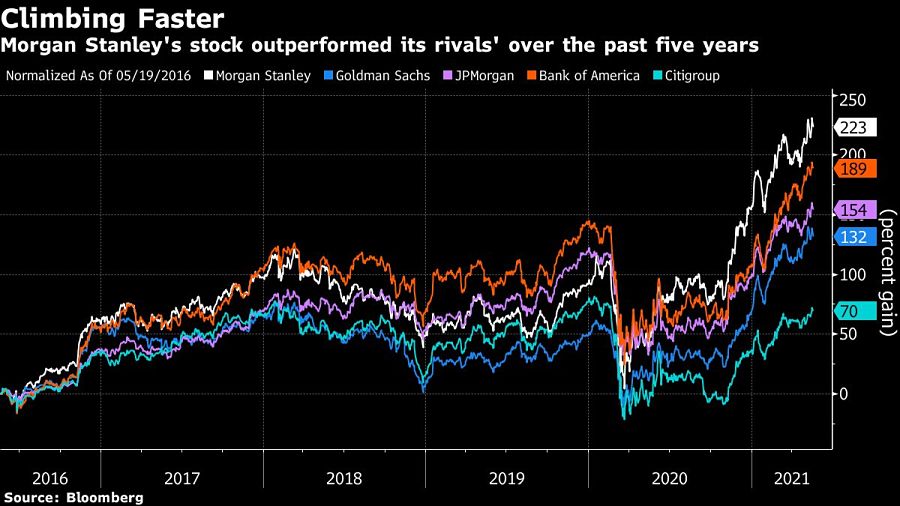

Morgan Stanley Chief Executive James Gorman unveiled his biggest leadership shake-up in more than a decade, positioning a small group of lieutenants -- and two in particular -- as his most likely successors.
Ted Pick, the architect of Morgan Stanley’s trading revival, and Andy Saperstein, who built the company into a wealth-management powerhouse, were tapped as co-presidents and given expanded roles atop the Wall Street bank that’s been gaining ground on rivals.
Among a slate of others changes: Investment management chief Dan Simkowitz will gain clout as co-head of strategy alongside Pick, and CFO Jon Pruzan will become chief operating officer.
The shuffle thrusts the quartet into a public bake-off to succeed Gorman, whose 11-year tenure makes him one of the longest-serving heads of any major U.S. bank. Behind the scenes, the boss has told the board he plans to stay on at least three more years, according to a person familiar with the matter.
“I am highly confident one of them will be the CEO in the future,” Gorman, 62, said of his leadership team in an interview. “It feels like the right time to more formally set up a transition over the next few years.”
The shakeup happens to come just two days after JPMorgan Chase & Co.’s Jamie Dimon -- the only head of a giant U.S. bank with a tenure longer than Gorman’s -- reconfigured his own leadership team, promoting two women who could someday assume his post.
Morgan Stanley’s CFO role will pass to investor relations head Sharon Yeshaya, giving her a more prominent voice among investors and analysts.
The spot as Gorman’s top deputy had been vacant for two years since the exit of the firm’s colorful President Colm Kelleher, who was older than the CEO. That departure set off a race for the next generation of executives, and Gorman gave them some time to prove themselves.
He ultimately landed on two who were key to Morgan Stanley’s comeback from the 2008 financial crisis, helping to strengthen its Wall Street operations and building up a franchise tending to customers’ money. Morgan Stanley has turned out the best stock performance among top rivals in the last five years, making managers hopeful that it’s forever buried the pejorative that long dogged the company: the littlest big bank.
At one point early last year, senior executives gloated over printouts about the bank’s soaring shares relative to archrival Goldman Sachs Group Inc. More recently, Morgan Stanley even overtook the market value of Citigroup Inc., which commands twice the assets.

With Pick, 52, Gorman is promoting a turnaround artist. He’s credited with rebuilding the firm’s equities business after the financial crisis, honing it into Wall Street’s dominant player. He then followed up by overhauling a fixed-income division that had been flagging. That won him oversight over Morgan Stanley’s investment bank -- including both trading and dealmaking.
While Pick will continue to run the institutional securities business, he will also be in charge of international operations.
Saperstein, 54, led the bank’s charge in wealth management, building a reliable revenue generator that’s become the envy of many rivals. Gorman himself had made his name in that business at Merrill Lynch, where he worked with Saperstein, and together the pair made it the centerpiece of Morgan Stanley’s pivot after the financial crisis.
Along the way, Morgan Stanley took over Smith Barney from Citigroup and last year scooped up ETrade Financial Corp. -- assembling a franchise that contributes almost as much to the top-line as the investment bank.
The sedate handoff Gorman is setting up is quite a change from when he assumed the top perch in 2010. At the time, the firm was staggering away from an era of vicious infighting in its senior ranks and the global financial crisis. Soon after the Melbourne-born banker took over, he confronted the grim possibility of a catastrophic downgrade by one of the premier credit-rating firms.
“Back then, we were reeling from the financial crisis, we had a number of problems we needed to resolve,” Gorman said. “This is different. You make these changes when you can and from a position of strength.”

Elsewhere in Utah, Raymond James also welcomed another experienced advisor from D.A. Davidson.

A federal appeals court says UBS can’t force arbitration in a trustee lawsuit over alleged fiduciary breaches involving millions in charitable assets.

NorthRock Partners' second deal of 2025 expands its Bay Area presence with a planning practice for tech professionals, entrepreneurs, and business owners.

Rather than big projects and ambitious revamps, a few small but consequential tweaks could make all the difference while still leaving time for well-deserved days off.

Hadley, whose time at Goldman included working with newly appointed CEO Larry Restieri, will lead the firm's efforts at advisor engagement, growth initiatives, and practice management support.
Orion's Tom Wilson on delivering coordinated, high-touch service in a world where returns alone no longer set you apart.
Barely a decade old, registered index-linked annuities have quickly surged in popularity, thanks to their unique blend of protection and growth potential—an appealing option for investors looking to chart a steadier course through today's choppy market waters, says Myles Lambert, Brighthouse Financial.
